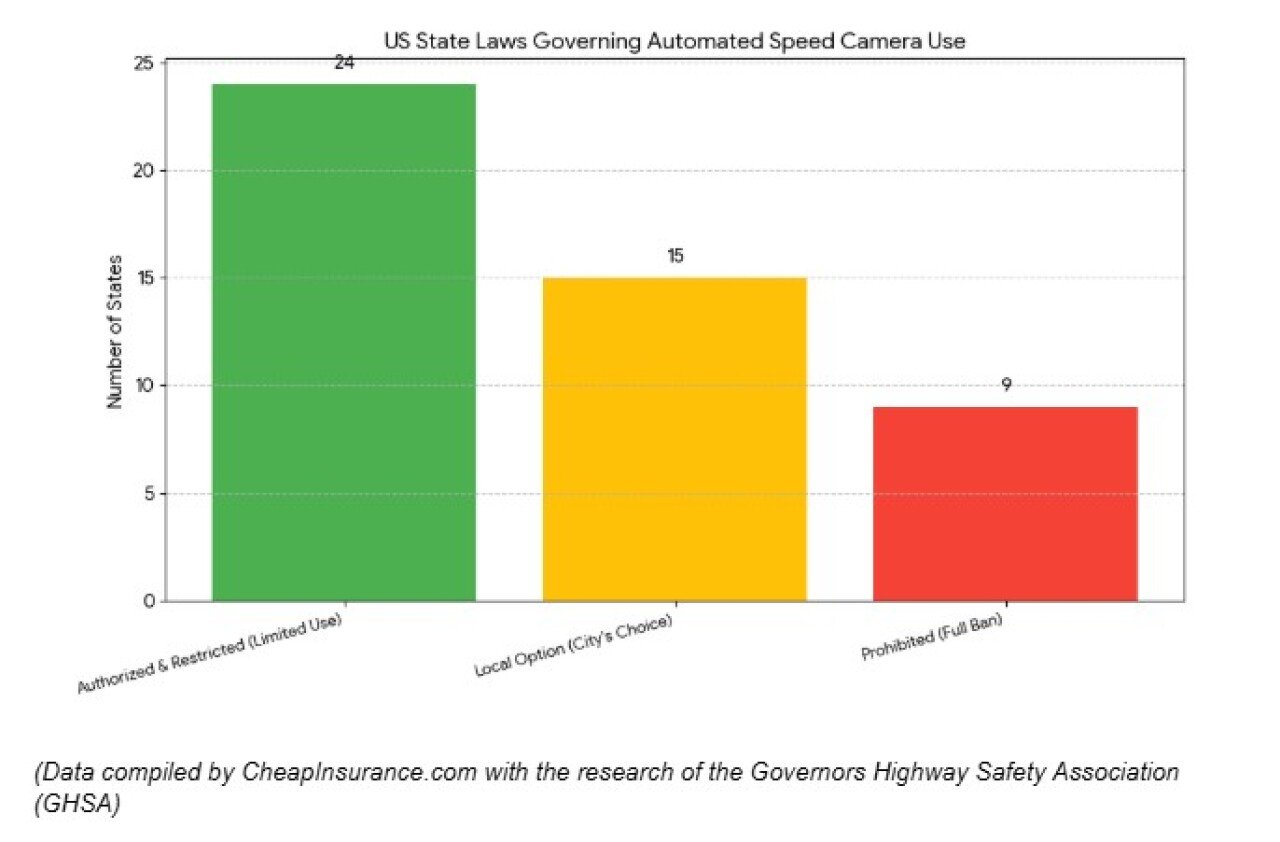Getting a speeding ticket is never a good time. Receiving one in the mail, issued not by a police officer but by an emotionless electronic eye, can feel like a violation of your rights. These automated systems, often called speed cameras or photo radar, are a hot button issue. They spark heated debates about public safety, due process, and whether they are just a revenue grab for cash-strapped municipalities.
So the big question is, are speed cameras legal where you drive? CheapInsurance.com provides a breakdown of complex state laws, local ordinances, and often strict and confusing restrictions. Your experience with automated enforcement can change drastically just by crossing a state line.
In the United States, there's no single federal law governing the use of speed cameras. Instead, there is a diverse patchwork of rules created by each state legislature. This leads to three main categories:
1. The prohibited club (No cameras allowed)
A handful of states have explicitly banned the use of automated speed enforcement. These states have generally decided that the risks to civil liberties or the potential for abuse outweigh the safety benefits.
If you’re driving in one of these states, you can likely breathe a small sigh of relief, at least from the robotic ticket-writer. However, this only applies to the automated systems; traditional, human-operated speed traps remain very much in play.
2. The authorized and restricted zones (limited use)
This is where the majority of states, and the bulk of the complexity, lies. Many states permit speed cameras but severely limit where and how they can be used. The philosophy here is to target the most high-risk areas while preventing widespread, general enforcement.
The most common permitted zones are:
If you live in a state like Maryland or Illinois, you need to be constantly aware of your surroundings. That seemingly innocuous van parked on the side of a school zone road may be a high-tech ticket machine.
3. The local option (city’s choice)
In some states, the law is silent on a statewide ban or mandate, effectively kicking the can to local municipal governments. This means legality can change block-by-block. For example, a city like Dayton, Ohio, might operate an extensive speed camera program, while a neighboring township may choose not to use them at all.
This ambiguity is a source of continuous legal challenges and political battles, as local city councils debate whether to implement the controversial systems.
(Data compiled by CheapInsurance.com with the research of the Governors Highway Safety Association (GHSA)

Even in states that permit them, speed cameras are rarely a free-for-all. To satisfy legal challenges and public outcry, most state laws require specific protocols that offer drivers a degree of protection and transparency. These restrictions often serve as the best defenses against a ticket.
1. Mandatory warning signs
A core requirement in most jurisdictions is that the automated enforcement area must be clearly marked with signs. The goal isn't to trick drivers, but to get them to slow down; deterrence, not revenue, is the stated public policy goal. If a camera issues a ticket where no legally required warning sign was present, the ticket may be contestable.
2. The speed buffer
In a nod to the fact that cruise control isn't perfect and speedometers have slight variance, most laws include a "speed buffer." This means the camera won't issue a citation unless you are traveling a certain amount over the speed limit.
3. Civil vs. criminal violations
This is arguably the most important legal distinction. In most states with automated enforcement, a photo-issued ticket is considered a civil fine, similar to a parking ticket, not a criminal or moving violation.
4. Photographic evidence requirements
Most states require that the notice of violation include clear photographic evidence. This usually means:
When a traffic ticket is issued, whether by a police officer or a camera, the direct fine is just the beginning. The far greater long-term expense is often the spike in car insurance quotes.
The first thing to understand is the important difference between a traditional ticket and an automated ticket when it comes to insurance.
While the camera ticket may not directly raise your car insurance rates, there are still situations where it can harm your financial standing:
The debate over speed cameras is far from over. Proponents point to studies showing reduced fatalities and severe injury accidents, while critics slam the systems as unfair taxation by citation. As technology evolves and legislative sessions continue, the map of legality is constantly being redrawn.
Ultimately, your best defense against an automated ticket remains the simplest one: know your local laws, and watch your speed in those designated safety zones. Stay vigilant, because sometimes, the most serious traffic enforcer isn't a human in a cruiser, but a little silver box with a lens.
This story was produced by CheapInsurance.com and reviewed and distributed by Stacker.
Reader Comments(0)